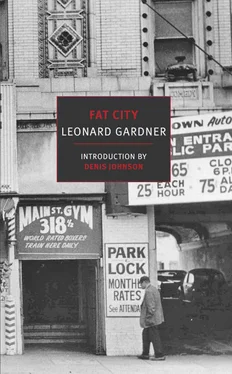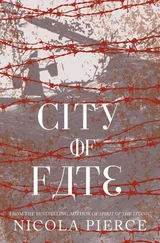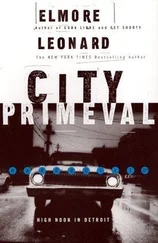Leonard Gardner - Fat City
Здесь есть возможность читать онлайн «Leonard Gardner - Fat City» весь текст электронной книги совершенно бесплатно (целиком полную версию без сокращений). В некоторых случаях можно слушать аудио, скачать через торрент в формате fb2 и присутствует краткое содержание. Год выпуска: 2015, Издательство: NYRB Classics, Жанр: Современная проза, на английском языке. Описание произведения, (предисловие) а так же отзывы посетителей доступны на портале библиотеки ЛибКат.
- Название:Fat City
- Автор:
- Издательство:NYRB Classics
- Жанр:
- Год:2015
- ISBN:нет данных
- Рейтинг книги:5 / 5. Голосов: 1
-
Избранное:Добавить в избранное
- Отзывы:
-
Ваша оценка:
- 100
- 1
- 2
- 3
- 4
- 5
Fat City: краткое содержание, описание и аннотация
Предлагаем к чтению аннотацию, описание, краткое содержание или предисловие (зависит от того, что написал сам автор книги «Fat City»). Если вы не нашли необходимую информацию о книге — напишите в комментариях, мы постараемся отыскать её.
Fat City — читать онлайн бесплатно полную книгу (весь текст) целиком
Ниже представлен текст книги, разбитый по страницам. Система сохранения места последней прочитанной страницы, позволяет с удобством читать онлайн бесплатно книгу «Fat City», без необходимости каждый раз заново искать на чём Вы остановились. Поставьте закладку, и сможете в любой момент перейти на страницу, на которой закончили чтение.
Интервал:
Закладка:
Leonard Gardner
Fat City
BIOGRAPHICAL NOTES
LEONARD GARDNER was born in Stockton, California. His short stories and articles have appeared in The Paris Review, Esquire, Southwest Review , and Brick , among other magazines. His screen adaptation of Fat City was made into a film by John Huston in 1972; he subsequently worked as a writer for independent film and television. For his work on the series NYPD Blue he twice received a Humanitas Prize (1997 and 1999) as well as a Peabody Award (1998). In 2008 he was the recipient of the A. J. Liebling Award, given by the Boxing Writers Association of America. A former Guggenheim Fellow, he lives in Northern California.
DENIS JOHNSON has published eight novels as well as novellas, short stories, reportage, poetry, and plays. His novel Tree of Smoke won the 2007 National Book Award.
INTRODUCTION
Exactly which year of the 1960s the book came out, I can’t remember, but I remember well which year of my lifetime it was — I was discovering that it wasn’t a joke anymore, I was actually going to have to become a writer, I was too emotionally crippled for real work, there wasn’t anything else I could do — I was eighteen or nineteen. Newsweek reviewed Fat City , a first novel by Leonard Gardner, in a tone that seemed to drop the usual hype—“It’s good. It really is.” I wanted to get a review like that.
I got the book and read about two Stockton, California, boxers who live far outside the boxing myth and deep in the sorrow and beauty of human life, a book so precisely written and giving such value to its words that I felt I could almost read it with my fingers, like Braille.
The stories of Ernie Munger, a young fighter with frail but nevertheless burning hopes, and Billy Tully, an older pug with bad luck in and out of the ring, parallel one another through the book. Though the two men hardly meet, the tale blends the perspective on them until they seem to chart a single life of missteps and baffled love, Ernie its youth and Tully its future. I wanted to write a book like that.
My neighbor across the road, also a young literary hopeful, felt the same. We talked about every paragraph of Fat City one by one and over and over, the way couples sometimes reminisce about each moment of their falling in love.
And like most youngsters in the throes, I assumed I was among the very few humans who’d ever felt this way. In the next few years, studying at the Writers’ Workshop in Iowa City, I was astonished every time I met a young writer who could quote ecstatically line after line of dialogue from the down-and-out souls of Fat City , the men and women seeking love, a bit of comfort, even glory — but never forgiveness — in the heat and dust of central California. Admirers were everywhere.
My friend across the road saw Gardner in a drugstore in California once, recognized him from his jacket photo. He was looking at a boxing magazine. “Are you Leonard Gardner?” my friend asked. “You must be a writer,” Gardner said, and went back to the magazine. I made him tell the story a thousand times.
Between the ages of nineteen and twenty-five I studied Leonard Gardner’s book so closely that I began to fear I’d never be able to write anything but imitations of it, so I swore it off.
When I was about thirty-four (the same age Gardner was when he published his), my first novel came out. About a year later I borrowed Fat City from the library and read it. I could see immediately that ten years’ exile hadn’t saved me from the influence of its perfection — I’d taught myself to write in Gardner’s style, though not as well. And now, many years later, it’s still true: Leonard Gardner has something to say in every word I write.
— DENIS JOHNSON
FAT CITY
1
He lived in the Hotel Coma — named perhaps for some founder of the town, some California explorer or pioneer, or for some long-deceased Italian immigrant who founded only the hotel itself. Whoever it commemorated, the hotel was a poor monument, and Billy Tully had no intention of staying on. His clean laundry he continued to put back in his suitcase on the dresser, ready to be hurried away to better lodgings. He had lived in five hotels in the year and a half since his wife had left him. From his window he looked out on the stunted skyline of Stockton — a city of eighty thousand surrounded by the sloughs, rivers and fertile fields of the San Joaquin River delta — a view of business buildings, church spires, chimneys, water towers, gas tanks and the low roofs of residences rising among leafless trees between absolutely flat streets. Along the sidewalk under his window, men passed between bars and liquor stores, cafés, secondhand stores and walk-up hotels. Pigeons the color of the street pecked in the gutters, flew between buildings, marched along ledges and cooed on Tully’s sill. His room was high and narrow. Smudges from oily heads darkened the wallpaper between the metal rods of his bed. His shade was tattered, his light bulb dim, and his neighbors all seemed to have lung trouble.
Billy Tully was a fry cook in a Main Street lunchroom. His face, a youthful pink, was lined around the mouth. There was a dent in the middle of his nose. Thin scars lay one above another at the outer edges of his brows. Crew-cut on top and combed back long on the sides, his rust-colored hair was abundant. He was short, deep-chested, compact, neither heavy nor thin nor very muscular, his bones thick, his flesh spare. It was the size of his neck that gave his clothed figure its look of strength. The result of years of exercise, of lifting ten- and twenty-pound weights with a headstrap, it had been developed for a single purpose — to absorb the shock of blows.
Tully had not had a bout since his wife had left him, but last night he had hit a man in the Ofis Inn. What the argument involved he could no longer clearly recall, and he gave it little thought. What concerned him was what had been revealed about himself. He had thrown one punch and the man had dropped. Tully now believed he had given up his career too soon. He was still only twenty-nine.
Down stairs carpeted with rubber safety treads, where someone fell nearly every night, he set off for the YMCA to test himself on the punching bags. Enjoying a sense of renewal after a morning of hangover, he walked quickly along the cold streets.
In a subterranean locker room, hearing a din from the swimming pool, Tully removed his clothes. He had four tattoos, obtained while in the army and now utterly disgusting to him: a blue swallow in flight over each nipple, a green snake wound up his left wrist, and on the inside of his right forearm a dagger piercing a rose. Wearing pale-blue trunks and a gray T-shirt, he went silently down a corridor on soft leather soles toward the sound of a furiously punched bag. When Tully entered the room at the end of the corridor, a tall, lean, sweating youth glanced up, took a final swing at the bag and sat down on a bench amid a disarray of barbells on the cracked concrete floor. There was no one else in the room. Tully swung his arms, rolled his neck, squatted, and rose in alarm at a loud pop in his knee, conscious all the while of the boy’s stillness. After his violent activity at the bag, he now sat motionless on the bench, looking at the wall. It was the attitude of one wishing to repel attention, and so, perversely, Tully invited him to box, though he himself had come here only to punch the bag.
The boy rose then, quickly and gloomily. “You a pro?”
Tully could see he was looking at his brows. “I was. I’m all out of shape now. We’ll just fool around easy, and I can show you a few things, okay? I won’t hit you hard.”
Читать дальшеИнтервал:
Закладка:
Похожие книги на «Fat City»
Представляем Вашему вниманию похожие книги на «Fat City» списком для выбора. Мы отобрали схожую по названию и смыслу литературу в надежде предоставить читателям больше вариантов отыскать новые, интересные, ещё непрочитанные произведения.
Обсуждение, отзывы о книге «Fat City» и просто собственные мнения читателей. Оставьте ваши комментарии, напишите, что Вы думаете о произведении, его смысле или главных героях. Укажите что конкретно понравилось, а что нет, и почему Вы так считаете.












